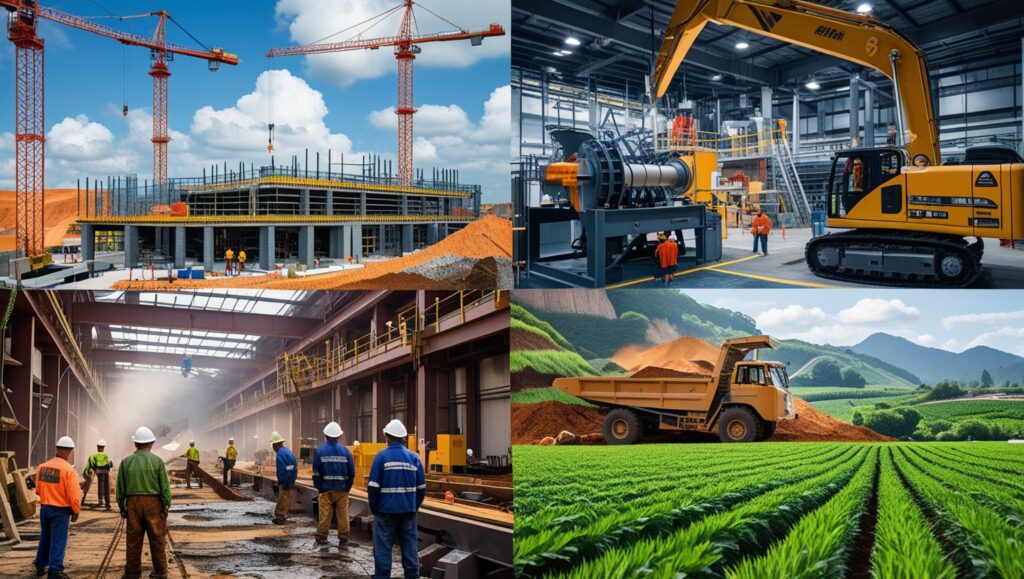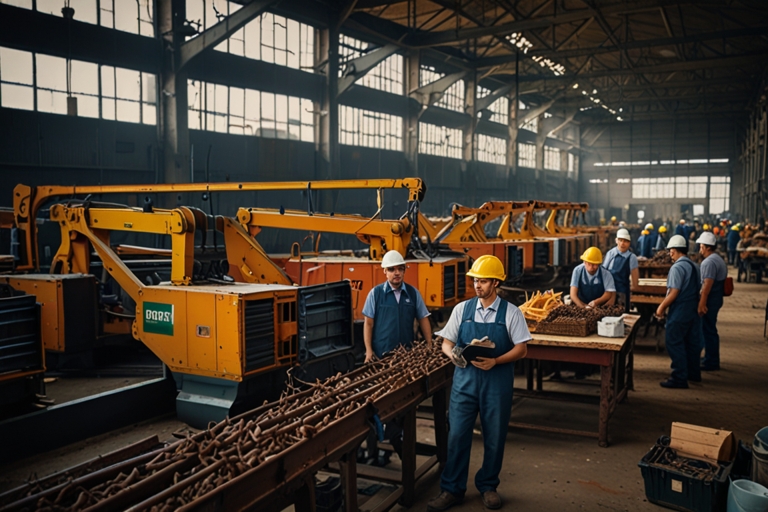What Do Basic Industries Jobs Pay?
Fundamental industries are the foundation of a country’s economy. Among them are manufacturing, construction, mining, and agriculture, which distribute the raw materials we need every day. They are vital for the economy and give us goods such as steel and services such as food, building construction, and energy.
However, a common question that job seekers frequently ask is, “What do jobs in basic industries pay?” You may think this topic is simple, but the truth is, it isn’t. Wages in these industries are decided by different elements, such as role, place of work, experience gained, and economic issues. In this guide, you will find information on what basic industry jobs pay and the factors that affect their salaries. You will also learn about different roles within these industries.
What Do We Mean by Basic Industries?
These industries point to the extraction of resources, the making of goods for other areas, and the supply of fundamental services, whether for the public or for private businesses. Significant investments in both equipment and people are generally necessary in these sectors. Besides stabilizing the economy, they also help develop particular fields. Basic industries are crucial to all economic activities.
Sectors classed as basic industries include:
This industry is responsible for making machinery and various goods, chemicals, and foodstuffs. Manufacturing is essential in every country, whether developed or developing.
Infrastructure: The industry builds infrastructure for the public, such as homes, offices, roadways, and bridges. Buildings, business centers, and engineering projects can employ these workers.
Mining: Mining involves drilling for oil, mining coal, and extracting minerals and other essential materials for use in factories, energy plants, and farms.
In many parts of the world, the economy relies on agriculture, which grows the raw materials needed by food production and other industries.
Utilities include water, electricity, gas, and waste management, all of which we depend on every day.

How Basic Industries Set Their Salaries
How much is earned in basic industry work depends on various things. How much someone on either end of the wage scale earns is mainly the result of these different factors. So, what are the most critical determinants?
a. Geographic Location:
The location of your work significantly influences your pay. For instance, due to the high living expenses in New York City, a construction laborer there may earn more than a laborer working in a distant rural area. Likewise, mining engineers at remote sites receive higher pay to compensate for their demanding jobs and separation from family.
b. Economic conditions and what’s in demand:
When some industries expand, earnings usually get higher. In periods when construction activity increases, the number of workers needed also increases, so wage levels go up. However, in some industries that are waning, such as coal mining, earnings and the number of opportunities may fall because fewer people want these jobs.
Experience and skill level are part of c.
Having experience is essential. Initially, entry-level jobs have lower pay, but as staff gain credits or skills, they can advance to higher-paid jobs. Workers who have welding, project management, or engineering skills can expect to make more than others in basic industries.
d. Job Type:
Available salaries within the industry often depend on what particular job you are doing. Project managers in construction can expect to earn a pay upgrade due to what they do. Furthermore, technical skills from studying mining and manufacturing mean higher pay for engineers, geologists, and technicians in these areas.
e. Company Size:
Large companies are sometimes able to offer greater salaries and better benefits than more modest firms in the same sector. Because of their high revenue, these companies regularly pay top talent well to compete for talent.
f. Union Membership:
Because of collective bargaining, union employees mostly enjoy better pay and more extensive benefits. We find that unions representing construction and manufacturing roles enhance the quality of compensation and conditions for their members.
Read more: Best Average Cost of a Paint Job for a Truck

What Do People Do in Basic Industries?
The basic industry sector has both unskilled and advanced job roles. Find examples of the jobs that are most popular below:
a. Laborer:
Laborers move and carry heavy stuff and participate in construction and manufacturing tasks. Although technical skills are not essential, these activities play a crucial role in ensuring the business operates efficiently.
b. Engineer:
In basic industries, engineers are responsible for creating, applying, and enhancing industrial operating processes. Whether an engineer is designing tools for industry or building infrastructure, their role is essential. You can work in civil, mechanical, industrial, or electrical engineering.
c. Technician:
Technicians in basic industries are responsible for maintaining and repairing equipment. They support the proper operation of equipment and essential systems. For example, employees in mining might handle drilling tools, and in agriculture, they may fix irrigation.
d. Machine Operator:
In manufacturing, operators run automated devices to make goods. These workers typically require technical knowledge to handle large machinery safely.
e. Manager/Supervisor:
Managers and supervisors manage operations, oversee teams, and ensure all projects are finished when they should be and at the correct cost. They are responsible for making important decisions, choosing goals, and managing the use of resources.
f. Environmental Specialist:
They ensure that industrial companies follow all environmental laws and regulations. They are key to sustainable development in mining, manufacturing, and farming and to following environmental rules.
Read More: https://www.indeed.com/cmp/Basic-Industries-1/salaries
What Salaries Typically Earn Basic Industries Job Holders
Although wages in basic industries vary by location and role, we can determine their average values. Here you can find a list of average career salaries and the roles associated with them:
Manufacturing
Wages for a manufacturing laborer are between $30,000 and $45,000 yearly.
An industrial engineer can take home between $70,000 and $90,000 per year.
The machine operators earn about $40,000 to $55,000 each year.
A plant manager can be paid anywhere from $100,000 to $150,000 per year.
Construction
Annual earnings for a construction laborer fall between $30,000 and $50,000.
Surveyors earn between $50,000 and $70,000 each year.
A construction manager may earn anywhere from $80,000 to $120,000 each year.
Civil engineers earn between $60,000 and $85,000 each year.
Mining
Mining technicians are paid between $45,000 and $65,000 per year.
A mining engineer gets paid between $80,000 and $120,000 on average each year.
On average, geologists are paid between $60,000 and $90,000 a year.
Agriculture
Farm workers earn between $25,000 and $35,000 a year.
The annual salary for agricultural engineers is within the range of $60,000 to $75,000.
A farm manager can expect to earn between $50,000 and $70,000 a year.
Utilities
Annual salaries for utility workers are $35,000 – $55,000.
Most environmental health specialists earn between $55,000 and $75,000 a year.
The figures presented here are approximate and may vary according to someone’s background and where they work.
Variations in Basic Industry Salaries on a Regional Basis
Peer Industries’ data shows that geography is an essential reason for salary differences. For instance:
Cities with a high cost of living, such as New York and San Francisco, usually have higher wages. However, a higher cost of living in these cities might cost you the same amount or more compared to a lower-paying one.
Greater Isolation: In mining or agricultural jobs, workers in rural locations typically receive higher pay due to their remoteness from many convenient amenities.
In developing parts of the world, basic industry jobs have the potential to raise wages for people working in construction and mining.
Background in Basic Industries
Your pay in basic industries depends significantly on your education. Some jobs require little education, while others require special qualifications.
There are jobs in construction and agriculture that require only a high school diploma as a starting point.
Most jobs as machinists, electricians, and technicians usually ask for vocational training or an associate degree.
Higher roles, such as those held by engineers or project managers, tend to ask for a bachelor’s degree or even more specific learning.
Learning through experience can enhance future earning potential. Those who have experience and expertise from several years of working in basic industries should enjoy higher pay.
Companies in basic industries are creating new jobs and opportunities for employment.
The situation for jobs in basic industries is hopeful primarily, though it differs slightly from sector to sector.
With a growing number of people living in cities, there will be a greater need for new and improved infrastructure, which will lead to jobs in construction.
Demand for mineral and energy resources is high, and it occurs mainly in nations rich in natural resources.
As the population grows, there will be a greater need for farmers and advanced tools to produce sufficient food.
Despite the increasing automation, we expect the overall manufacturing industry to remain strong and consistent.
Steps to Progress in Basic Industries Careers
Pay attention to these points for progress in your career in basic industries:
Become eligible for high wages by studying for and obtaining the proper certificates or qualifications.
Knowing a lot about particular fields or roles can improve your worth in a company.
The more experience you have, the greater your chances are of moving up in your career. Demonstrate that you are ready to do more.
Relationships with others in your profession can bring you exciting opportunities along the way.
The Strengths and Weaknesses of Work in Basic Industries
Pros:
Robust Industries: Because they are fundamental to the economy, basic industries help ensure a stable job future for staff.
Most jobs in these industries come with excellent pay, and this increases with your experience.
With exceptional knowledge, you can find many ways to advance your career in the field.
Cons:
Lots of construction and agricultural workers have jobs that are physically very challenging.
Risky Environments: Irresponsible environments, such as those in mining and manufacturing, may threaten workers’ well-being.
Long Working Hours: Many basic industry jobs, mostly in construction, ask their staff to work more than one shift every day.
Conclusion of What Do Basic Industries Jobs Pay
In short, the pay for different roles in basic industry jobs varies greatly depending on their particular position, years of experience, and location. Even if beginner roles do not pay much, careers in engineering, management, or technology can pay highly. Proper education, a track record of experience, and living in the correct place allow many in these industries to make a good living and shape their careers.
FAQ’s What Do Basic Industries Jobs Pay
What do we mean by basic industries?
Basic industries are areas that supply the raw materials used in making other types of products. Mining, manufacturing, agriculture, and construction are examples of basic industries.
What is the salary for people working in basic industries?
Earnings in basic industries vary widely. On average, entry-level positions pay a salary of $25,000-$50,000, but engineers and managers might receive $70,000 or more.
Can I have a lasting career in basic industry work?
Because of their stability and opportunities in unique jobs, basic industries often give employees a chance to advance in their careers.
What should I do to progress in a basic industry position?
Adding to your education, gaining more certificates, learning new skills, and gaining experience often allow you to make more money and go further in your job.
